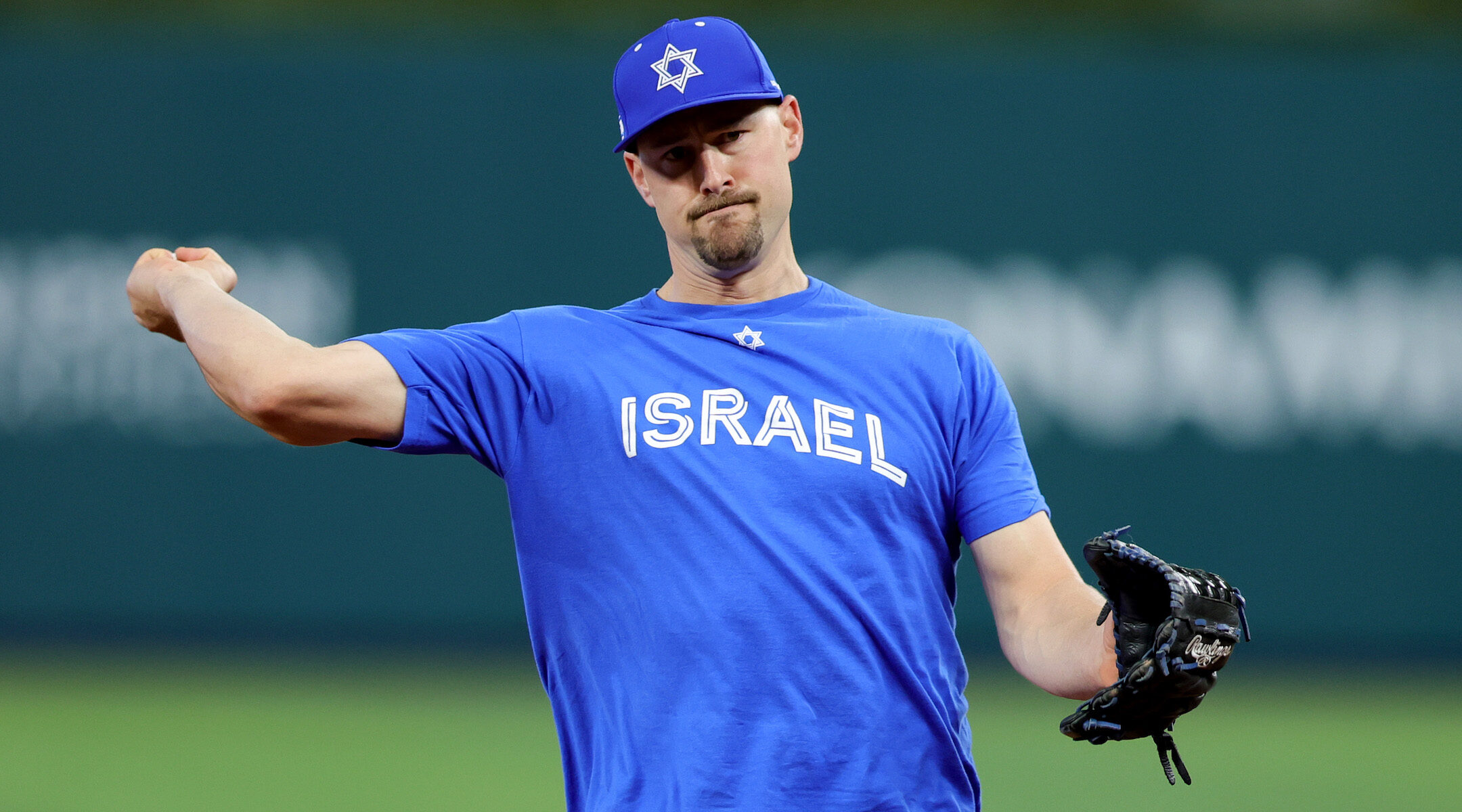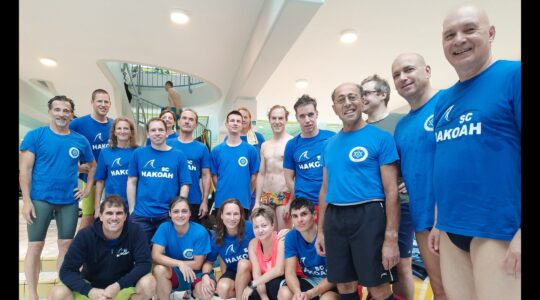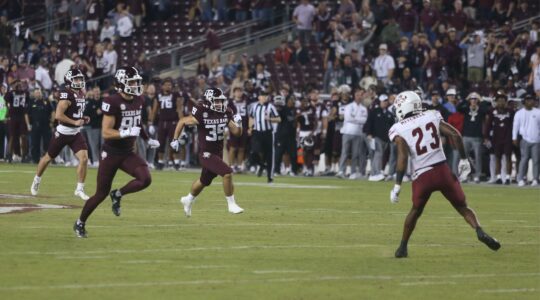(JTA) — On Sept. 30, Ryan Lavarnway and Team Israel took the field in the Czech Republic to battle the host country for fifth place at the 2023 European Baseball Championship. Israel lost 5-1 and finished sixth in the biennial tournament.
One week later, some of Lavarnway’s teammates were hastily called into active duty by the Israel Defense Forces in the wake of Hamas’ surprise attack on Oct. 7 that killed and injured thousands.
“It’s crazy to see people that I was playing a game with, doing the thing I love with, then be activated and on the frontlines of this conflict,” Lavarnway told the Jewish Telegraphic Agency in a phone interview.
Lavarnway, 36, was a journeyman catcher in the MLB, playing for eight different teams over 10 years. He played for Israel in the 2017 World Baseball Classic qualifier and tournament, the 2020 Summer Olympics and the 2023 WBC. He obtained Israeli citizenship prior to the Olympics and recently wrote a children’s book about his experience.
Though Lavarnway officially retired from the MLB earlier this year, he was named captain of Team Israel ahead of the European tournament, which Israel is scheduled to host in 2025. He said he is undecided about playing for Israel in the future.
But even as his on-field presence is up in the air, Lavarnway has become a go-to speaker at pro-Israel events on college campuses and for Jewish organizations around the country.
Lavarnway will appear at two upcoming Israel solidarity events with the Jewish National Fund-USA, an organization that advocates for American support for Israel. The group has also helped support Israel’s burgeoning baseball program, including by funding a portion of the team’s Olympics expenses and by helping build new baseball fields in Israel. Lavarnway will speak at JNF’s Global Conference for Israel in Denver at the end of November and at another event in Chicago in December.
According to a JNF spokesperson, the two events will “serve as an opportunity for supporters of Israel to unite as a community during Israel’s darkest days, while also learning about the organization’s emergency aid efforts providing housing, food, clothing, and more to thousands of displaced and traumatized families.”
“Anything that I can do to help people feel like they’re not alone and to give them an excuse to to distract themselves or free themselves from drowning in it even for a short while, I feel like that is a positive role I can play without trying to know what the right answer or the right thing to say is,” Lavarnway said.
Lavarnway grew up with a Jewish mother and Catholic father and said that he got closer to his Jewish faith in high school. But he told JTA he “didn’t feel a huge connection to my Judaism, to any religion, to the community at all” until playing for Team Israel — an experience that many of the team’s American Jewish players went through.
He said he has lost sleep over the war in Israel and is especially disheartened by the rise of antisemitism and misleading information that has circulated online since the violence began.
“The biggest thing that our Israeli native counterparts keep asking is to help spread the truth, because there’s so much misinformation out there,” Lavarnway said. “So many people are hearing things that stem from propaganda from the terrorist group, that we just want people to understand what’s really happening.”
Instead of getting involved in debates over Israel’s military response or other political issues, Lavarnway said his main focus is on supporting Jews.
“Being the captain of the Team Israel national team puts me in a position where I feel a responsibility to stand up and speak out,” he said. “As a baseball player, I don’t know the right answer. I don’t know the right thing to say. I don’t know that there is a right thing to say, and I don’t know that there is an answer, but what I’ve taken my role and my responsibility to do is just try to help people in the community not feel isolated and alone, and try to spread hope and positivity where I can.”
Lavarnway said athletes have a critical role to play in supporting fans during difficult times — and he commended some of his fellow Jewish baseball players for recent acts of solidarity, like a video he was part of from a large group of Jewish baseball players calling on fans to stand up for Israel.
“I think athletes have the unique ability to be visible in a strictly positive and supportive way,” he said. “We’re not politicians, we’re not members of the military. People are not looking for us or to us for the right answer. If anything, they’re looking to us for representation and for role models. And that is what Alex Bregman did. That is what Ian Kinsler did. That is what Kevin Youkilis is doing. It’s helping people feel like they’re not alone, and that there’s hope.”
Last week, Lavarnway participated in a video put together by Hillel International, Chabad on Campus and a number of other Jewish organizations, with the goal of sending support to Jewish college students amid a spike in antisemitism on campuses. (Lavarnway speaks around the 43:30 mark.)
“I think that we need community more than ever right now,” Lavarnway told JTA. “I got many messages through my social media channels from college students that just said, ‘Thank you for helping me not feel like I’m alone.’”
Plenty of non-Jewish athletes have spoken out, too, including NBA stars LeBron James and Kyle Kuzma, the latter being a teammate of the league’s lone Israeli, Deni Avdija. Lavarnway said those messages of support go a long way.
“I think the Jewish community has taken a lot of pride for a very long time in supporting other cultures, other ethnicities, other oppressed minorities,” he said. “And right now, Jewish people need that support back. So when other people that are not Jewish offer that support or reach out a hand in a time where it feels like there’s not a lot of people doing that, it speaks volumes.”
The former big leaguer is no stranger to the role sports can play in the face of tragedy. Lavarnway was a key member of the 2013 Boston Red Sox that won the World Series just months after the Boston Marathon bombing, which killed three and injured hundreds.
“What I learned after the Boston bombings and playing for that 2013 Boston Red Sox team that embodied ‘Boston Strong,’ was by playing a game and by doing what we had always done and what we loved, we gave people a sense of normalcy for three hours,” Lavarnway said. “Unfortunately Team Israel is not playing baseball right now to offer that solution, but when I speak in public, or I speak at conventions or gatherings, my hope is to give people 45 minutes where we don’t have to feel like we’re drowning in this right now.”
JTA has documented Jewish history in real-time for over a century. Keep our journalism strong by joining us in supporting independent, award-winning reporting.






